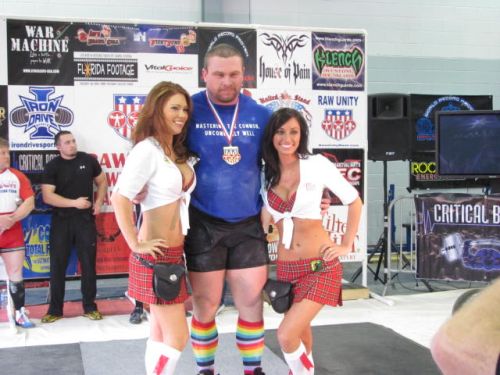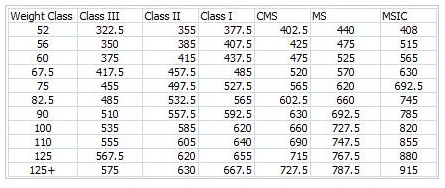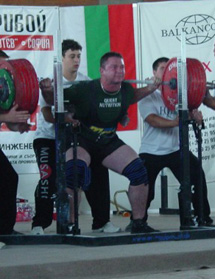The Russian Classification Plan
by Mike Tuchscherer

What is your experience level as a Powerlifter? Kind of a hard question to answer, huh? Some will answer with how many years they've been competing. Others will tell you their total. Still others might give a vague "not much" or "been around a while".
What if I told you we have a tool that allows us to approximate a lifter's experience level? Well, there are many charts out there for classifying lifters, but the one I have had the most success with is the Russian Classification Chart.
The Russian Classification Chart matches a lifter's raw total against his weight class to give an experience classification.

You would then look up your weight class in the left column. Then you trace to the right until you can no longer meet the requirements. So this lifter meets Class II requirements, but not quite Class I requirements. Therefore, he is a Class II lifter.
So now that you know that, what does it mean? If you are below Class III, then you are considered a Novice lifter. That may be a shot to the ego of some, but it is better to accept it and move forward than it is to fight it. If you are Class I, II, or III, then you are what is considered a "Rated Lifter". CMS stands for Candidate to Master of Sport, which means you are likely to be a competitive on a National level. MS stands for Master of Sport, which means you are likely to be winning national level contests. MSIC stands for Master of Sport, International Class. These lifters are competitive at the world level. There is one classification above MSIC. That is World Champion. There is no total associated with this classification – it is usually apparent to coaches when an athlete reaches this level of achievement.
Now the important stuff... Why do you care? If you have ever heard of me talk about "appropriate training", your classification can help you determine what that is. As a lifter gets stronger, they learn to use their body more efficiently. They develop certain systems and coordination between systems. This means that there are certain changes that take place in the body to accommodate all of this.
So knowing what classification you are can give you vital information on how to best program training for your body. Did you make that deductive leap with me? Let's try to look at it this way...

We all know that a novice lifter will need to train differently than an MSIC. They have completely different needs as athletes. It also stands to reason that these changes should happen gradually as the lifter progresses. At certain stages of development, certain modes of work are more appropriate than others. This classification can help you determine what is most likely appropriate for you.
Now into the meat-and-potatoes of it....
As a novice lifter, you need lots of sub-maximal repetition in the contest movements. It is important to develop your movement patterns properly and this is one of the best ways to do it. As you continue along these lines, you will get stronger and develop better coordination for the contest movements. You are best suited with 3x weekly training and full body sessions. Keep intensity in the 80-85% range for most of your training time.
As you advance, tonnage should go up and average intensity should SLOWLY go up as well. Around the Class I level, I usually introduce 4x weekly training (depending on the athlete). I also gradually lengthen the training blocks as the experience level grows. Why? Because it takes longer to respond to a stimulus as you improve. Max Effort work can usually be introduced as a Class I lifter. Movement selection is usually targeted toward General-Specific exercises compared to training of other classifications.
It gets much trickier as a lifter progresses into the MS/MSIC levels. They require higher training volumes and frequencies. They also require ever-increasing intensities, even to the point where 100%+ work is performed regularly (but still only during certain stages of training). Training at this level is highly individualized and is regularly adjusted to fit the needs of the athlete. Movement selection also begins to gravitate back toward the contest movements, which can sometimes make programming the various protocols a delicate process.
This is vital information to the efficient programming of training. If you would like to learn more, Eric Talmant's DVD covers the Russian Classification System in fantastic detail and is complete with specific Total Rep and Intensity recommendations for each class of lifter. Additionally, I am working to develop a Training Guide, which will include specific recommendations for each class of lifter. The shortfall with this project is that I don't know when it will be done. That means it will likely be quite a while.
Mike Tuchscherer is the owner of Reactive Training Systems, a company dedicated to individualized physical training. The goal of RTS is to help you become a dominant force in your sport! Learn more by visiting www.ReactiveTrainingSystems.com.
Mike himself is an accomplished Powerlifter. He has over 12 years of experience training and researching the best training methods in the world. Mike has competed in raw and single ply competitions. He recently won the Gold medal representing the USA at the 2009 World Games; becoming the first American male to ever win this distinction. His best lifts in IPF competition are a 903 squat, a 644 bench press, an 826 deadlift, and a 2342 total in the 275 pound weight class.
More Articles By Mike Tuchscherer
Return to the Workout Articles Archive
|